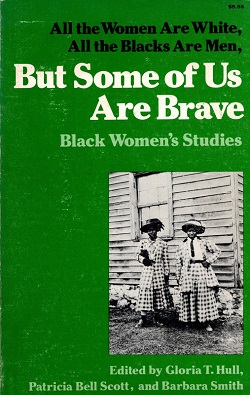All the Women Are White, All the Blacks Are Men, But Some of Us Are Brave facts for kids

First edition
|
|
| Editors | Akasha Gloria Hull Patricia Bell-Scott Barbara Smith |
|---|---|
| Publisher | Feminist Press |
|
Publication date
|
1982 |
| Pages | 401 |
| Awards | National Institute's Women of Color Award |
| ISBN | 0912670959 |
| OCLC | 8165060 |
All the Women Are White, All the Blacks Are Men, But Some of Us Are Brave is an important book from 1982. It's a collection of writings, called an anthology, about Black Women's Studies and feminist ideas. The book was put together by three editors: Akasha Gloria Hull, Patricia Bell-Scott, and Barbara Smith. It has been printed many times.
Contents
Why This Book Is Important
Akasha Gloria Hull received a special award for her work on this book. It was called the National Institute's Women of Color Award. Her contributions helped people pay more attention to the lives of Black women. Before this book, many studies about women focused mostly on white women. Also, studies about Black people often focused only on Black men. This book helped to fix that imbalance.
How This Book Came About
In the 1970s, more people became interested in black feminism. This is a type of feminism that looks at the experiences of Black women. Writers like Mary Helen Washington, Audre Lorde, and Alice Walker helped this interest grow.
In 1981, another important book called This Bridge Called My Back was published. But Some of Us Are Brave came out the next year. Both books talked about how race and gender are connected. This idea is called intersectionality. The writers in these books felt that earlier feminist movements mainly focused on issues important to white women. They wanted to make sure that women of color had a bigger voice. These books helped change how people thought about feminism.
Its Big Impact
This book had a lasting impact on how we understand fairness and equality.
What Is Intersectionality?
A legal expert named Kimberlé Crenshaw mentioned But Some of Us Are Brave in her famous paper from 1989. In this paper, she introduced the idea of intersectionality. Intersectionality helps us understand how different parts of a person's identity, like their race and gender, can combine. These combinations can create unique challenges or experiences.
Crenshaw said that But Some of Us Are Brave was one of the few books about Black women's studies. She used its title to help explain her idea of intersectionality. She wanted to show how treating race and gender as separate things can cause problems.
Other Scholars Referencing This Book
Another scholar, Barbara Y. Welke, wrote an article in 1995. Its title was "When All the Women Were White, and All the Blacks Were Men." This title was a direct reference to But Some of Us Are Brave. Welke explained that the book's title highlights a problem. It shows what happens when we think of race and gender as completely separate ideas.
Related readings
- This Bridge Called My Back, edited by Cherríe Moraga and Gloria E. Anzaldúa
Who Wrote for This Book?
Many different writers contributed their work to But Some of Us Are Brave. Here are some of them:
|
See also
- Chicana feminism
- Black feminism
- Womanism
- Third-world feminism
- Home Girls: A Black Feminist Anthology
- Daughters of Africa

